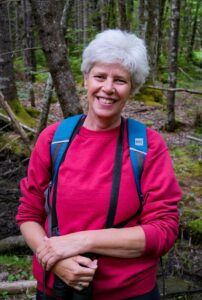Julie Palmer: Protecting Nature on All Fronts
02 Jul 2024
Julie Palmer can pinpoint the moment that protecting nature became her life’s goal. “I was maybe ten years old,” she says. “We had a cottage north of Toronto, and my dad pointed out algae in the lake. He said, ‘This isn’t good, this is a sign of too many cottages and it chokes out the fish.’ And I said, ‘We need to get everybody together to clean it all up!’” And indeed, Julie has been steadfastly committed ever since to doing her part to protect the natural world.

Julie Palmer, at the June 2024 group hike in Acacia Valley. Photo credit: Jacques Giard
After earning her Bachelors in Environmental Studies and Math from the University of Waterloo in 1987, she worked for Metro Toronto Works Department to launch waste diversion programs. “We started a household hazardous waste program, compost collection, the blue box program – it was amazing what we accomplished during that time,” Julie recalls. “But it was working in an office, in a government facility – that was just not me.” She went back to school to complete a Masters of Environmental Studies from York University in1993.
Her path unexpectedly led her to a thirty-year career as a yoga teacher, but she continued her work with the environment in other ways, leading canoe trips, teaching birding-by-ear workshops, and supporting many different environmental action groups. She feels particularly called by trees and puts much of her energy into efforts to save forests.
“I’ll tell you a story about how that began,” she says. “I was at the cottage by myself in my twenties in Muskoka, and we had a wraparound deck where they left a hole for a birch tree, maybe twelve inches in diameter. I touched the tree,” she says, then pauses. Then she continues, “and it touched me back. I don’t know how else to describe that. Our culture doesn’t train us to feel that nature is sentient or can communicate with you.” She was already volunteering at that time with Earthroots, a grassroots conservation organization in Ontario, but she says that that moment was really the beginning of her “call to protect forests.”
Julie moved to Nova Scotia in 1998 – “best move I ever made!” she laughs. “I didn’t really realize I wasn’t a city person until I lived rurally. It took some getting used to – walking down a trail and not seeing anybody else. What do I do if I turn an ankle?” But she quickly made connections with her new community, ending up on the board of the Annapolis Field Naturalists. In 2002, she heard through the grapevine that the then-young Nova Scotia Nature Trust was hosting celebrated anthropologist and explorer Wade Davis as a guest speaker at a fundraising dinner; while she didn’t end up attending the event, it turned out to be the beginning of a connection with the Nature Trust that will last through and beyond her lifetime.
“My parents sadly passed, my dad in 2021, my mom in 2019, and I’m the only child,” Julie explains. “They had a condo in Toronto so I came into an inheritance.” She also started thinking about her own wishes for the future. “My life’s going to end too! I’m turning 62 in three weeks, and I’m in great shape, no real issues. But you do start to think: how can I leave the world a better place?” She decided to include the Nature Trust as a beneficiary in her will. As she puts it, “10% of whatever’s left when I go will go to the Nature Trust. I don’t have children of my own, my husband has two grown daughters out west, so this is what my life is more and more about – protecting nature on all fronts.”
“I felt so alone in it for so long,” she says. “But you have to stay away from hopelessness. You find like-minded people, and you feel like there IS something you can do. Now there’s a groundswell of more caring people, who will hopefully be able to eventually turn it around – the climate change, the biodiversity loss.” And in order to do that, she adds that “Everybody has to pick the piece that’s going to work for their lifestyle and go for it. You have to focus on what you’re good at, what are my strengths. I’m not good at presenting to politicians, facts and figures, but I’m good at organizing things, connecting people.” That strength is abundantly clear – from the moment she landed in Nova Scotia, Julie has consistently volunteered, organized, and supported many different conservation and activist groups near her now-home outside Bear River, throughout the Annapolis Valley, and beyond.
And through all her dedicated work to protect nature from many different angles, Julie finds hope. She recently went to a Swallow nesting box workshop hosted by the Arlington Forest Protection Society, where she learned how to assemble, install, and clean the nesting box. “I put the box up in early May, and almost right away – two Tree Swallows!” Her nesting box now hosts a happy Tree Swallow family, with some chicks hatched but not yet fledged. “Every time I look at it,” says Julie, “I think, I just created habitat! I did that!”
